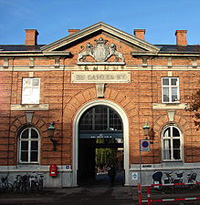Transforming the old age home
Health in the Humanities Seminar with Anders Møller (PhD Fellow at the Centre for Healthy Aging and Saxo Institute) presenting insights from his PhD project on the practices of old age focusing on the transformation of old age homes in the municipality of Copenhagen, ca. 1891-1974.

De Gamles By is a home for the elderly occupying an extensive site in the Nørrebro district of Copenhagen, Denmark. Established in 1892.
The old age home
The presentation is based on the PhD project Locating Practices of Old Age, which is an inquiry into how old age is configured in specific practices of the old age home. The project is situated in the period ca. 1891-1974 within the municipality of Copenhagen.
The public institution of the old age home is fairly new. In Denmark it stems from the end of the 19th century, were some elderly people were ‘made’ old aged and delineated from the social-legal category of the poor, thus was old age established as a specific legal and social category. This category of people was provided with certain rights and could receive public support. The majority received the support in cash, but others received the support as a place in an old age home.
Constituting old age
These public institutions continued to emerge but also changed in the 20th century. In this presentation Anders Møller will analyse how an old age home in Copenhagen was transformed in the 1930’s and 1940’s. Anders Møller proposes to study the old age home as a site of aging, where visions and versions of old age were both produced by and inscribed into the buildings, regulative and activities. These can be seen as old age practices constituting the old age home, thus old age is not inherent, fixed nor stable, instead it is on-going, located in space and concrete practices, both discursive and material.
Transformations and modernisation
In the first part of the presentation Anders Møller will qualify what was pointed out as (un)fit for the elderly lives, untimely and misplaced. In other words which functions, rooms, stuff, knowledge and people was kept, modernized and condemned. Anders Møller will do this by exploring empirical examples from the source material, which consist of buildings, architectural plans, articles, regulations, administrative records and documents.
Finally, Anders Møller will discuss this transformation, which he tentatively describes as modernisation, and how it can be contextualised. Anders Møller argues to open the analysis to several encounters between different people, professions and knowledge productions. The transformations connects societal welfare initiatives, moral, expectations to later life, as well as concrete and local experiences from the old age home, and influences from the knowledge production within the emerging medical field of geriatrics and gerontology.
The presentation is part of the Health in the Humanities Seminar Series organized by Copenhagen Centre for Health Research in the Humanities (CoRe).
